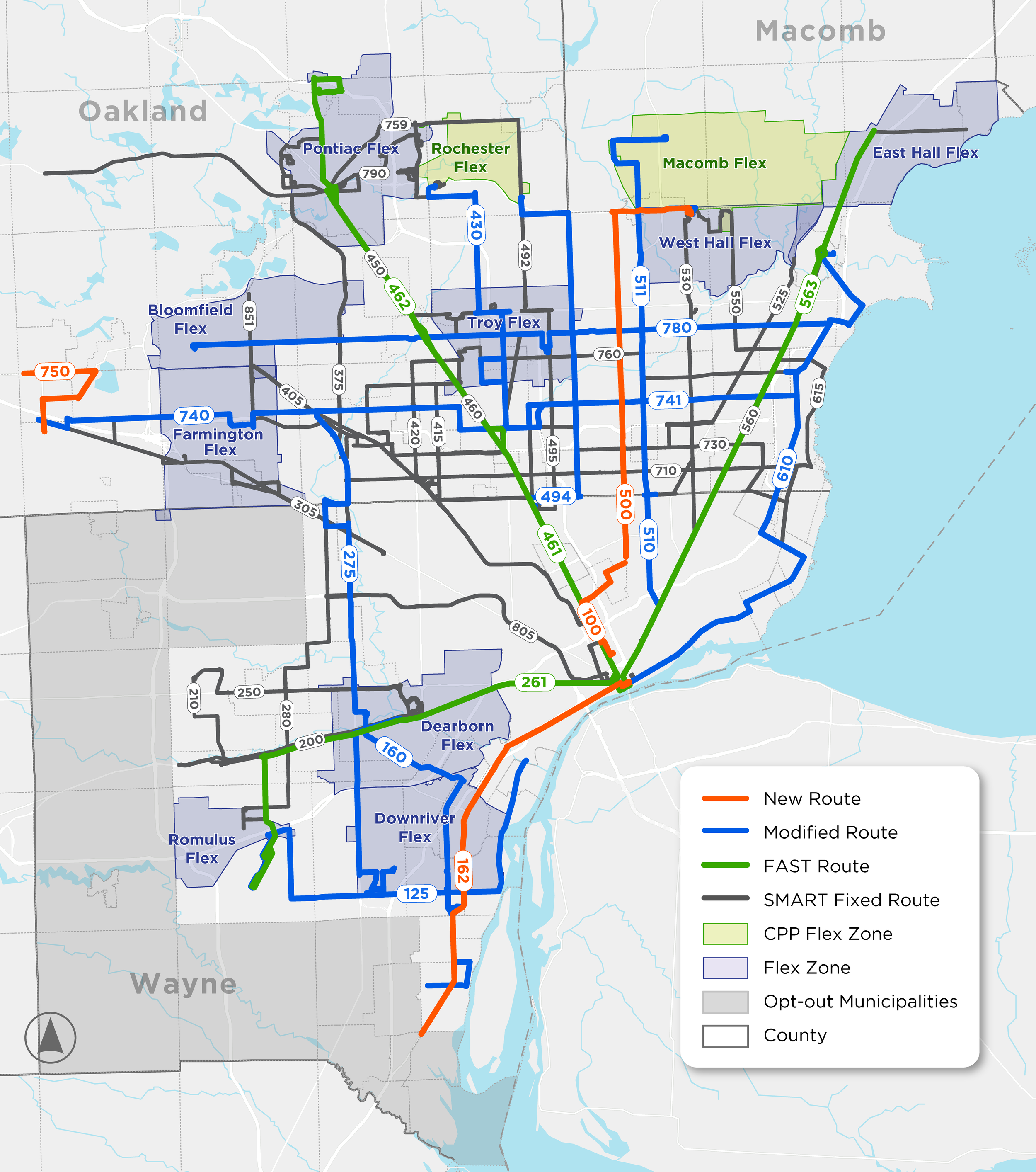Offering more connections to the places people need to go most often through a combination of new and modified routes and Flex Zones.
Click on a route name to view details
4 New Routes
11 Flex Zones
Troy (no proposed change)
The final recommended SMARTer Network was updated to reflect final input provided during the last round of engagement that was completed in April 2025. The final report will be released later this summer.
More Connections
Offering improved connections to 54,000 more jobs, 6,384 more businesses, and places such as:
Bloomfield
Hamtramck
Macomb
Mount Clemens
River Rouge
Rochester
Romulus
Sterling Heights
Trenton
Warren
Wixom
Wyandotte
More Options
Flex Zones
By providing more options that increase mobility for all with more Flex Zones. This offers improved access and opportunities for people to get where they need to go.
Short trip? Ride Flex!
Live or work too far from a fixed bus route? Ride Flex!
More Reliability
Clock-hand timing. Your bus will come at the same time every hour.
Better timed layovers. By building in more time for layovers operators can stay on schedule more often.
FAST routes will run every 20 minutes during weekday peak hours (6am-8pm) and every 30 minutes during off-peak hours and weekends.
High ridership routes will run every 30 minutes during weekday peak hours.
All but 7 routes will offer daily service (an increase from 21 today to 38 in the SMARTer Network)
Late Night Flex Pilot
The SMARTer Network includes a proposed pilot Late Night Flex Zone, which would only operate during the hours of 10pm to 2am. This zone encompasses three of the proposed Flex Zones (Dearborn, Downriver, and Romulus) as well as the surrounding areas. Riders would be able to schedule a trip anywhere within this zone during the late-night hours. In addition, riders could use this Late Night Flex as a first- or last-mile connection to the SMART bus routes in the area (125, 162, 261, and 275). To save costs, the local bus routes in this zone would end service when the Late Night Flex Zone takes effect (160, 200, 210, and the 250).
Proposed Routes to be Discontinued
140 Southshore
Coverage provided by modified route 160 and/or Dearborn/Downriver Flex Zones
255 Ford Rd Express
Covered by route 250 Ford Rd
562 FAST Gratiot Commuter
Covered by routes 560 Local and 563 FAST
620 Charlevoix/635-East Jefferson
Covered by modified route 610
830 Downriver Park And Ride
Covered by modified route 160 and new route 162
796 Pontiac - Perry - Opdyke
Covered by Pontiac Flex Zone
Proposed Route Frequencies and Service Hours
Leave a comment!
Have a comment on the SMARTer Network? Fill out of the comment field below and submit!
SMARTer Mobility Study
SMART launched the SMARTer Mobility Study in early 2023 to evaluate their fixed route/ADA, connector general service, and the current micro transit pilot program to aid in the evaluation and analysis of the services within the region. When complete, the Study will include:
Recommendations for service design and improvements for overall system efficiency and operational effectiveness
• Examination of all possible alternatives to address the existing services, as well as currently known, but unmet service requests that are anticipated in conjunction with new areas of development
• Comprehensive engagement with legislators, regional and local stakeholders, transit riders, and the communities
Latest News
Existing Conditions Report
The Existing Conditions Report has been published.
> Read the report
Community Engagement Round 1
The first round of community engagement is complete!
> View the Stats
Community Engagement Round 2
The second round of community engagement is complete!
> View the Stats
Community Engagement Round 3
Our final round of public engagement is underway!
> Learn More
The Study
The SMARTer Mobility Study is designed to be a comprehensive plan to guide decision-making for SMART as it relates to changes to their fixed-route service and Connector service. The plan will detail how SMART can achieve and maintain excellence in its system and service while operating as a premier transit system for the greater Detroit region. Addressing the needs and wants of its communities and partners is integral to the process.
Following the planning process, the SMARTer Mobility Plan will be an action-oriented strategy for making major investments and changes to service within SMART's system, and will guide the agency, its planning partners, the public, and regional stakeholders in setting priorities for major transit investments.


















